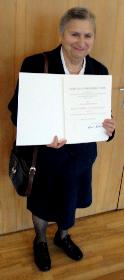A high official of the Genocide Research Center, Ričardas Čekutis, today published an article defending the recent neo-Nazi march in central Vilnius. Lithuania’s major daily, Lietuvos rytas, had identified him ten days ago as one of the key participants and organizers of the 1000-strong March 11th 2011 neo-Nazi march that proceeded through the center of Vilnius on the country’s Independence Day, with the participation of a member of parliament, and a permit from the municipality of Vilnius. The Jewish Community of Lithuania has protested the march on its own website (English translation here).
Events
Genocide Center Official defends neo-Nazi march
Neo-Nazis March in Central Vilnius on Lithuania’s Independence Day (with government permission and police escorts)
- EYEWITNESS REPORT
- by Sebastian Pammer
- PHOTOS BY SEBASTIAN PAMMER
From the internet site www.tautos-balsas.lt I learned that the march of Lithuanian nationalists would start today at 4 PM (1600 hours) at Cathedral Square in the very heart of Vilnius, where the city’s central boulevard, Gedimino Prospect, begins its ascent toward the nation’s Parliament at its other end.
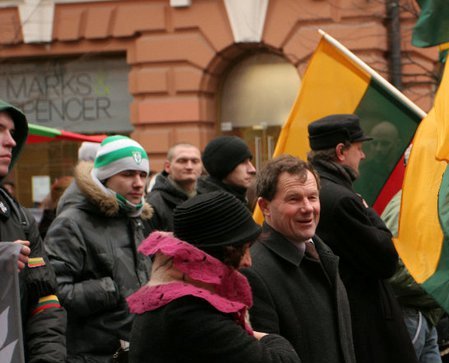
Kazimieras Uoka, at right, a member of the Lithuanian parliament from the Conservative party in power, was one of the leaders of the massive neo-Nazi march on the capital’s main boulevard on the country’s Independence Day.
I was shocked to see that one of the march’s leaders was a member of parliament from the ruling Homeland Union faction of the Conservative alliance in power (whose prominent Jewish member actually signed the Prague Declaration in 2008!). MP Kazimieras Uoka was marching at the very front. In 2010 Uoka’s pro-neo-Nazi activities were in evidence more than once. He had taken out the permit for last year’s Nazi march (Leonidas Donskis’s comment on that here) and then in May, he jumped the barricades to disrupt the wholly peaceful Gay Pride parade in Vilnius.
Vilnius Municipality’s Response to Wiesenthal Center’s Comments on Planned Neo-Nazi Parade on March 11th
The Vilnius city administration (municipality) said today that it had ‘no intention of responding to the statement’ issued by the Simon Wiesenthal Center on 17 February condemning its decision to provide a permit for yet another city-center Neo-Nazi parade in the capital on the occasion of its March 11th Independence Day.
The statement, issued by Dr Efraim Zuroff, director of the Wiesenthal Center’s Israel office quotes Dr Zuroff as follows:
London Fog: Lithuanian Foreign Ministry invests in a London ‘Graywash’
Letter of Protest signed by Lord Janner, MP MacShane, Professor Dov Levin, Rabbi Barry Marcus & 17 Others
———
DIGNIFIED MORNING PROTEST
Member of the UK Parliament, human rights champion and author RH Denis MacShane (right), led a good-natured moment of protest Monday morning, 7 February in London at the Lithuanian Embassy, 84 Gloucester Place, London W1.
MP MacShane presented a letter of protest to the embassy, drafted and organized by Professor Danny Ben-Moshe (center), who flew in from Melbourne to be at the event. At left is Danny Stone, director of the All-Party Parliamentary Group Against Antisemitism. The letter was signed by 21 people, including academics, political figures, those involved with the fight against antisemitism, representatives of Litvak organizations, and Lithuanian Holocaust survivors. The ambassador declined a written request to meet to discuss the letter.
PRESS: REPORT IN THE JERUSALEM POST ♦ IN THE ECONOMIST (REPLY HERE) ♦ ALFA.LT (8 Feb) ♦ BNS ♦ CLEMENS HENI (DH) ♦ DOVID KATZ (DH) ♦ LRYTAS.LT ♦ JONNY PAUL (JP) ♦ SIMON ROCKER I (JC) ♦SIMON ROCKER II (JC) ♦ SIMON ROCKER III (JC) ♦ NITZA SPIRO (JN) ♦ EFRAIM ZUROFF (JC)
Text of the Letter Delivered to the Lithuanian Ambassador in London on 7 February 2011
Text of the letter delivered to the Lithuanian ambassador in London Monday morning 7 February 2011 by the Right Honourable Denis MacShane MP. The letter was drafted by Danny Ben-Moshe and evolved with input from the other signatories. Signatories include Lord Janner of Braunstone, Rabbi Barry Marcus of Central Synagogue, and Professor Ada Rapoport-Albert, head of the Department of Hebrew and Jewish Studies at University College London which hosted the main conference. PDF here. Background and further links to press coverage here.
H.E. Dr Oskaras Jusys
Ambassador
Embassy of the Republic of Lithuania
84 Gloucester Place
London W1U 6AU
7 February 2011
Dear Ambassador
Andrius Navickas wins ‘Person of Tolerance’ Award in Lithuania
Journalist, editor and human rights champion Andrius Navickas was awarded this year’s Person of Tolerance award in a ceremony in Kaunas today. The annual award, founded by Open Society Lithuania’s founding director Dr Irena Veisaitė, goes to a personality who actively and courageously fought for tolerance in Lithuanian society.
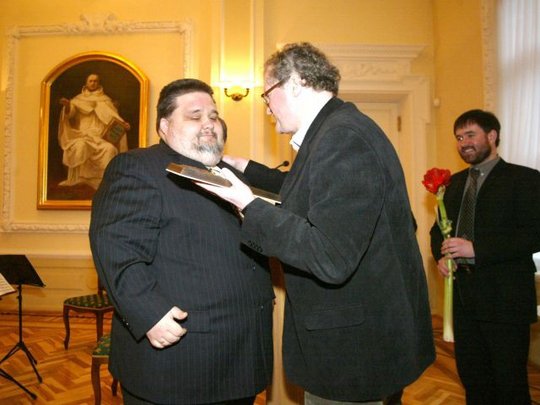
Andrius Navickas (left), editor of Bernardinai, accepts the Person of Tolerance award from MEP Professor Leonidas Donskis at a ceremony in Kaunas on 5 February 2011. Image: N. Povilaitis / Lrytas.lt
Lithuanian Jews, Holocaust Survivors, Specialists who Disagree with the Lithuanian Government — Shut Out of London Conference
O P I N I O N
by Dovid Katz
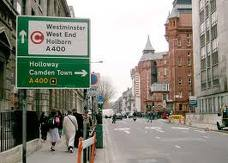 The Holocaust Survivor community is responding with a mixture of sadness and defiance to news that the Lithuanian Foreign Ministry, which actively coordinated the recent attempt (December 2010) to underpin ‘Double Genocide’ and downgrade the Holocaust in European Union law (see top story on home page), is now financing, in partnership with (naive?) parties in London, a starkly one-sided colloquium on ‘Jewish-Lithuanian Relations Between Coexistence and Violence’ on 6-7 Feb 2011 in London.
The Holocaust Survivor community is responding with a mixture of sadness and defiance to news that the Lithuanian Foreign Ministry, which actively coordinated the recent attempt (December 2010) to underpin ‘Double Genocide’ and downgrade the Holocaust in European Union law (see top story on home page), is now financing, in partnership with (naive?) parties in London, a starkly one-sided colloquium on ‘Jewish-Lithuanian Relations Between Coexistence and Violence’ on 6-7 Feb 2011 in London.
London Fog: Will the Conference be a ‘Graywash’?
Only in Eastern Europe: Convicted Nazi War Criminal, 96, is the Plaintiff
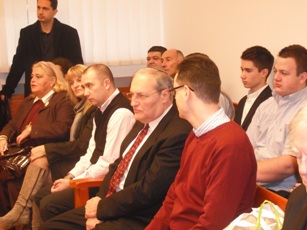 Judge Viktor Vadasz dismissed the case against the Simon Wiesenthal Center’s Israel Office director, Dr Efraim Zuroff, some ten minutes after its 8:30 AM start at the District Court of Pest at 25 Marko utca. Defending History.com was in court (with ATV and Hetek).
Judge Viktor Vadasz dismissed the case against the Simon Wiesenthal Center’s Israel Office director, Dr Efraim Zuroff, some ten minutes after its 8:30 AM start at the District Court of Pest at 25 Marko utca. Defending History.com was in court (with ATV and Hetek).
The Faith Church of Hungary, led by Pastor Sándor Németh, a major figure in the battle against antisemitism and Holocaust revisionism in the region, supported Dr Zuroff steadfastly throughout the saga. The hearing was also attended by representatives of the Novi Sad Municipal Assembly along with the former president of the Novi Sad Jewish community, Dr Ana Frenkel, who represented the community at the hearing. Novi Sad, Serbia, is the site of the murder of many of the victims of the alleged Nazi war criminal who brought this case.
Uncanny Darkness: Impressions of a Public Debate in Vilnius
O P I N I O N
by Algirdas Davidavičius
Algirdas Davidavičius, author of the text formerly published here [an essay and memoir on the December 8th 2010 Holocaust discussion held at the Misterija cafe on Totoriu Street in Vilnius, previously announced on Facebook and elsewhere as a public event] hereby apologizes to Mr Arūnas Brazauskas for inaccurately representing his opinion, and, under legal threat, has [on 16 December 2010] removed the text from DefendingHistory.com.
The author of the removed text also hopes to take and publish in the foreseeable future an interview with Mr Brazauskas on a number of questions mentioned in the formerly published text, and urges Mr Brazauskas to express his opinions more clearly and unequivocally.
- Algirdas Davidavičius
- Vilnius
- 16 December 2010
Sparse Turnout at Ninth Fort Holocaust Commemoration; Christian Leader Stirs the Assembled
According to historians, the largest slaughter of people in a single day in the history of the Baltic states occurred on the 29th of October 1941, when between nine and ten thousand Jews were gruesomely killed at the ‘Ninth Fort’ near Kaunas (Kovno), Lithuania, under Nazi German command. Highly motivated local forces carried out most of the killing and the associated humiliation and degradation of the victims. To mark the occasion there is a commemoration ceremony at the site held each year at midday on the last Sunday in October. This year it was held today, under a bright sun that warmed the clear chill of late fall in Lithuania.
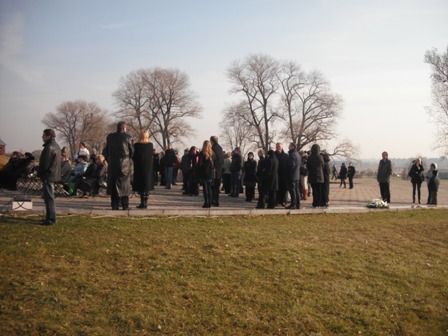 Organized by the Jewish Community of Kaunas, and addressed by its leader, Gercas (Hershl) Žakas, this year’s event drew just over a hundred people, filling less than half the paved plaza near the memorial dais. Survivors present expressed concern for the future status of Ninth Fort remembrance here, and Holocaust commemoration more generally. The concern echoes various factors, including the gradual disappearance of survivors and witnesses, the shrinking of the vestigial Jewish community, and the shifting political trends.
Organized by the Jewish Community of Kaunas, and addressed by its leader, Gercas (Hershl) Žakas, this year’s event drew just over a hundred people, filling less than half the paved plaza near the memorial dais. Survivors present expressed concern for the future status of Ninth Fort remembrance here, and Holocaust commemoration more generally. The concern echoes various factors, including the gradual disappearance of survivors and witnesses, the shrinking of the vestigial Jewish community, and the shifting political trends.
Green House Reopens in Vilnius; Kostanian is the Star
The Green House, as the Holocaust exhibit of the Vilna Gaon Jewish State Museum of Lithuania is internationally known, was formally relaunched today in Vilnius after a closure of several months for renovations, technical upgrading of a number of exhibits and the addition of video screens and other facilities.
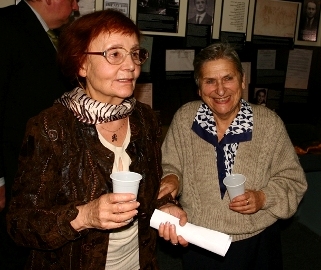
Rachel Kostanian (left) and Fania Yocheles Brantsovsky celebrate at the Green House’s Relaunch. Photo: Sebastian Pammer.
In a massive show of support for Rachel Kostanian, its beloved guardian and director since its inception over two decades ago, the diplomatic corps came out in force, including the ambassadors of Austria, France, Germany, Japan, Norway, UK and chargés d’affaires or consuls of Bulgaria, the Netherlands and the United States. There was a sense of relief that Ms Kostanian and her staff had succeeded to preserve not only the vast majority of images, texts and topics from the venerated old exhibit, but also its key message of straight-talking Holocaust studies that stays clear of the obfuscating discourse of ‘artificial balances, mitigations and excuses’ that runs rampant in this part of Europe.
Gathering in the Forest to Remember the 8000 Jews of the Svintsyan Region
Some eighty people gathered at midday today, in an eerie mix of wind and autumn sun, at the forest mass grave memorial site just outside the town once known in Yiddish as Svintsyánke (or Nay-Svintsyán; now Lithuania’s  Švenčioneliai, interwar Poland’s Nowo-Święciany). Such is the custom every year on the first Sunday in October, to remember the eight thousand Jewish civilians murdered there after a gruesome ten days of imprisonment, deprivation of basic human needs, and torture, in makeshift barracks here at the site, in October 1941. The eight thousand Jews were marched (with the lame and the old transported on wagons) from their hometowns in the area to the site on September 27th. They were all shot over a two-day period on the 7th and 8th of October 1941.
Švenčioneliai, interwar Poland’s Nowo-Święciany). Such is the custom every year on the first Sunday in October, to remember the eight thousand Jewish civilians murdered there after a gruesome ten days of imprisonment, deprivation of basic human needs, and torture, in makeshift barracks here at the site, in October 1941. The eight thousand Jews were marched (with the lame and the old transported on wagons) from their hometowns in the area to the site on September 27th. They were all shot over a two-day period on the 7th and 8th of October 1941.
Jewish Community’s Faina Kukliansky gives a Powerful Speech at Ponar Commemoration near Vilnius
This year’s commemoration ceremony at Ponar (Paneriai) was held today, attended by government officials, the diplomatic corps, and a sizable crowd of mostly Jewish participants. Ponar is the mass grave site near Vilnius where 100,000 civilians ― around 70,000 of them Jews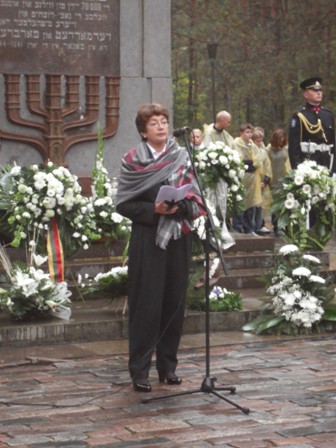 of Vilna and its environs ― were murdered by Nazi henchmen between 1941 and 1944. In 2005, Yale University Press brought out Kazimierz Sakowicz’s eyewitness account, Ponary Diary, where it is reconfirmed that most of the killing was done by volunteer local killers.
of Vilna and its environs ― were murdered by Nazi henchmen between 1941 and 1944. In 2005, Yale University Press brought out Kazimierz Sakowicz’s eyewitness account, Ponary Diary, where it is reconfirmed that most of the killing was done by volunteer local killers.
The country’s small but vibrant Jewish community was proudly represented by Faina Kukliansky, head of the Vilnius Jewish Community and vice chairman of the Jewish Community of Lithuania. In her speech (English translation here), Kukliansky, one of the country’s foremost attorneys, did not mince words. She explained that whatever differences of opinion may exist, the community was unanimous in condemning the Double Genocide movement, as well as projects to equate Nazi and Soviet crimes whose purpose is to trivialize or mitigate the Holocaust specifically and the notion genocide more generally. Moreover, she stressed the need to expose the identities of all the local killers who carried out the genocide of Lithuanian Jewry. She also mentioned that it was only the Jewish Community of Lithuania, not the Lithuanian or Israeli government, that established a fund to help each and every Holocaust era Lithuanian rescuer live a better life to the end of his or her days.Continue reading
Joseph Melamed, chairman of ALJ, Speaks Out Forcefully at Yad Vashem Event to Mark Anniversary of Vilna Ghetto Liquidation
 Attorney Joseph Melamed, chairman of the Association of Lithuanian Jews in Israel (at right) delivered the keynote speech today at an event held at Yad Vashem in Jerusalem to mark the September 23rd anniversary of the 1943 liquidation of the Vilna Ghetto. Because of the Jewish holidays, the event was moved up to the 20th this year.
Attorney Joseph Melamed, chairman of the Association of Lithuanian Jews in Israel (at right) delivered the keynote speech today at an event held at Yad Vashem in Jerusalem to mark the September 23rd anniversary of the 1943 liquidation of the Vilna Ghetto. Because of the Jewish holidays, the event was moved up to the 20th this year.
Those in attendance included Uri Chanoch, chairman of the Holocaust Survivors’ Association; Mr Michael Schemyawitz (left of photo), head of the Association of Vilna Jews in Israel and director of its Beit Vilna premises in the Montefiore section of Tel Aviv; and the top leadership of Yad Vashem including chairman Avner Shalev and director general Nathan Eitan. The program of speakers and was released in advance (in Hebrew) by the ALJ. Lithuania’s ambassador to Israel, HE Darius Degutis, delivered a conciliatory address (full text here), which included the moving line: ‘It breaks my heart and casts a shadow of shame that among the perpetrators of these crimes were also my countrymen. This cannot be, and will not be, either forgotten or forgiven’.
Joseph Levinson, 93, Holocaust Historian, Honored in London; But Q & A session is manipulated by translator
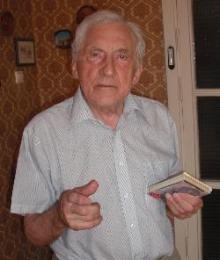
Elegantly chaired by the synagogue’s Rabbi Barry Marcus, a scion of luminous Lithuanian rabbis, himself born in South Africa, it included speeches by Iain Duncan Smith (‘IDS’), Britain’s Secretary of State for Work and Pensions, and the Israeli ambassador to the UK, HE Ron Prosor. The Central Synagogue’s hall was packed. [Added 20 September 2010: See the 2 Sept report in The Jewish News, and Simon Round’s interview with Mr Levinson in The Jewish Chronicle.]
Neo-Nazis, Protected by Police, flaunt Swasticals near Reval Lietuva Hotel During Baltic Pride Parade
BNS summary here. Video here. The state prosecution service that continues to ‘investigate for war crimes’ Holocaust survivors who joined the anti-Nazi resistance, and passes over neo-Nazi marches in utter silence, tried hard (but failed) to stop the May 8th Baltic Pride Tolerance march in Vilnius.
OUR EYEWITNESS REPORT:
After being refused entry into the actual Baltic Pride marchers’ area, on grounds that we did not have individual permits, we were directed to the plaza between the Reval Lietuva Hotel and the CUP department store where we were told the march’s concluding point could be observed. There, police eagerly directed visitors and sympathisers into an ‘observation area’ just below on a grassy hillside. It soon became evident that while limiting the formal numbers of Baltic Pride participants, the police were shepherding visitors into an area occupied by neo-fascists and bolstering their apparent numbers.
State Prosecutors ‘Visit’ Jewish Community on Holocaust Remembrance Day to ask Questions about ALJ chief Joseph Melamed
Officials from Lithuania’s state prosecution service came to the Jewish Community’s premises at Pylimo Street 4 in Vilnius today — during a Holocaust Remembrance Day event — to ask community officials for information about Joseph Melamed, 85, a Tel Aviv resident. The news spread rapidly and caused disquiet among the small remnant community.
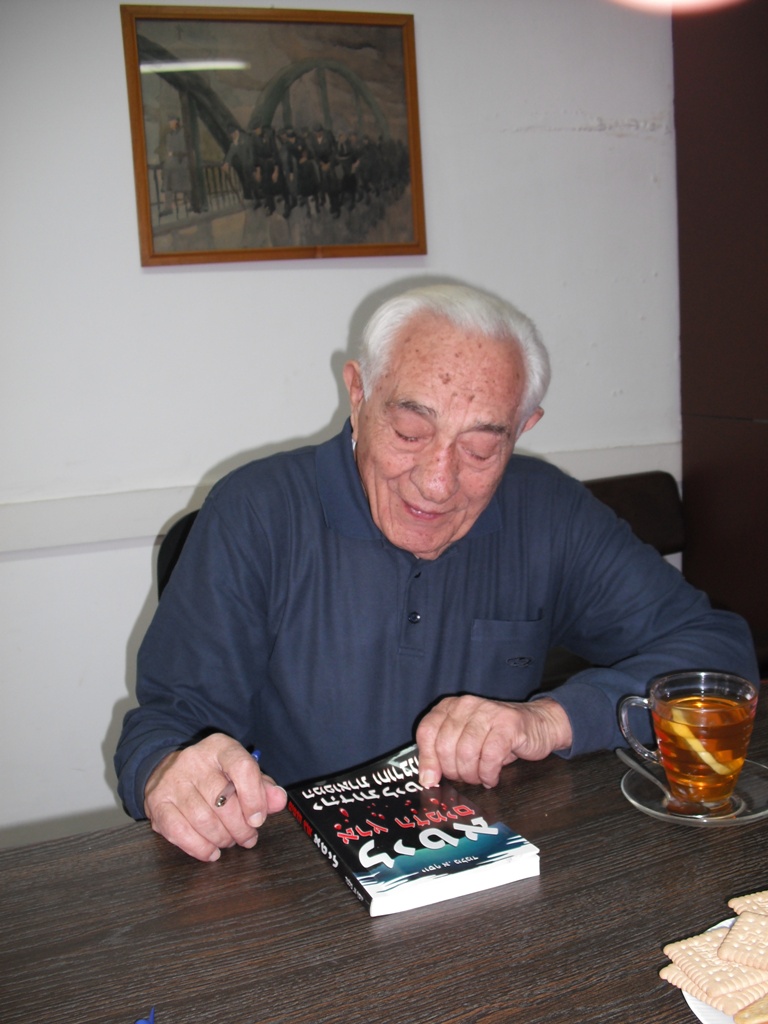
Attorney Joseph Melamed, a Holocaust survivor, with his Hebrew book ‘Lita’ (Lithuania) in his office at the Association of Lithuanian Jews on King David Boulevard in Tel Aviv
Mr. Melamed, head of the Association of Lithuanian Jews in Israel, possibly the world’s last active Litvak survivor organization, is himself a Holocaust (Kovno Ghetto) survivor, a veteran of the anti-Nazi partisans, veteran of the Israeli war of independence in 1948, a retired Israeli diplomat and a prominent attorney. He is the author and editor of various works about the Lithuanian Holocaust.
Prosecutors told the Lithuanian Jewish Community that they are ‘investigating’ Mr. Melamed in relation to his organization’s publication of lists of alleged local war criminals who are alleged to have participated in the annihilation of Lithuanian Jewry. A few of the people on these lists are considered ‘national heroes’ by various nationalist elements, especially those who joined the anti-Soviet resistance in and after 1944.
German President awards Fania Brantsovsky the Federal Cross of Merit
…Antisemitic Tirade Follows in Vilnius
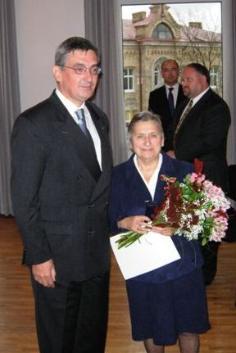
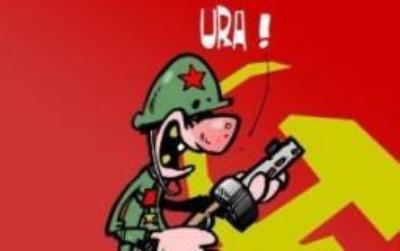 English translation of the report on the Baltic internet portal Delfi, including the remarks of a ruling-party member of parliament. It appeared with this caricature of the 87 year old Holocaust survivor who had just been honored by Germany’s president. Posted comments that threatened her with violence have now been removed. More details at Blaming the Victims (→ 28 Oct 2009). Daiva Repečkaitė and Milan Chersonski reply.
English translation of the report on the Baltic internet portal Delfi, including the remarks of a ruling-party member of parliament. It appeared with this caricature of the 87 year old Holocaust survivor who had just been honored by Germany’s president. Posted comments that threatened her with violence have now been removed. More details at Blaming the Victims (→ 28 Oct 2009). Daiva Repečkaitė and Milan Chersonski reply.
Meir Shub (1924 — 2009)
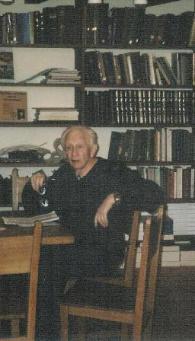
Professor Meir Shub
Holocaust in the Baltics, established on 6 September 2009, is dedicated to the memory of Professor Meir Shub (1924—2009), pictured at right teaching a class at Vilnius University in the early 2000s.
A historian and philosopher, he dedicated the last decades of his life to rebuilding Jewish studies in Vilnius, despite severe health issues deriving from his World War II wounds sustained as a Red Army soldier during the struggle against Nazism.
He was determined to inspire and train students of all backgrounds who would freely research Judaic topics, including the Holocaust. He was convinced that the success of these studies depended on the retention of a robust and intellectually free-feeling Jewish community component in such projects in Eastern Europe.
Meir Shub’s booming voice (which grew louder as his deafness worsened), straight talk, and high Litvak expectations of his students were trademarks. He is sorely missed. He played a pivotal role in achieving the first Oxford-Vilnius agreement in Judaic studies, and, in 1991-1992, was a visiting fellow at the Centre for Hebrew and Jewish Studies at Oxford University. His works include a study of the Gaon of Vilna.

